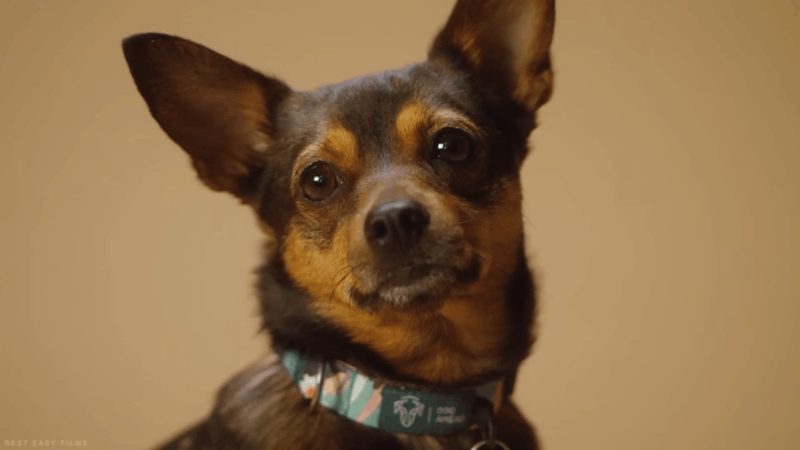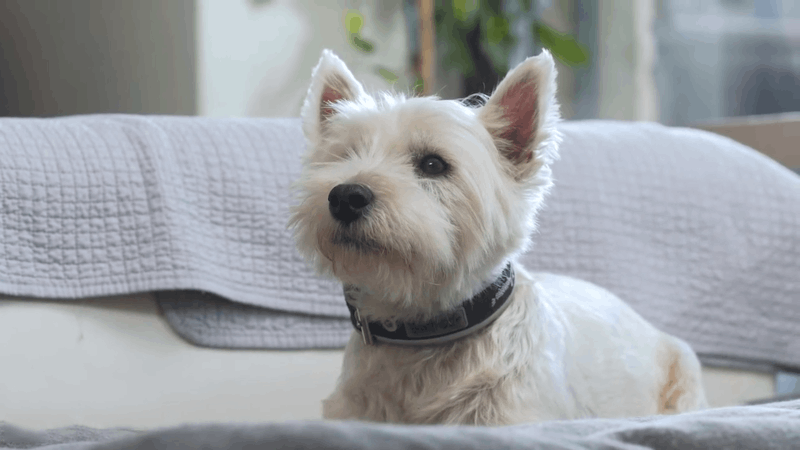No products in the cart.
In the quest for natural remedies to soothe hyperactivity in dogs, the question arises: “Does CBD help calm hyper dogs?” This inquiry into the potential calming effects of CBD has gained prominence among pet owners seeking natural solutions.
In this blog, we will explore dog CBD including the potential benefits of using CBD as a calming solution for dogs exhibiting heightened energy and restlessness. Let’s explore what the current research and insights have to say about this intriguing possibility.
Hyperactivity in Dogs and All Things We Should Know

Hyperactivity in dogs refers to an excessive level of energy and restlessness that can lead to disruptive behaviors. Dogs experiencing hyperactivity may struggle to focus, exhibit impulsive actions, and find it challenging to settle down.
This heightened state of activity can impact a dog’s well-being and interactions with its environment, often requiring intervention and management techniques to promote a balanced and calm demeanor.
Why is My Dog so Hyper?
A dog’s hyperactivity may be caused by a variety of circumstances. While each dog is unique, here are some common causes that can lead to excessive energy and restlessness:
- Breed traits: Certain breeds are naturally more energetic and prone to hyperactivity due to their genetics. Working breeds, terriers, and some herding breeds, for example, have high energy levels that require regular stimulation and exercise.
- Lack of exercise: Dogs need physical activity to expend energy. Inactivity can result in a buildup of energy, restlessness, and hyperactivity.
- Insufficient mental stimulation: Mental engagement is crucial for a dog’s well-being. Dogs that lack mental stimulation through interactive toys, puzzles, and training can become hyperactive due to boredom.
- Young age: Puppies are often naturally more energetic and excitable. Their curiosity and need to explore can contribute to hyperactive behavior.
- Lack of training: Dogs that haven’t received proper training and socialization might struggle to follow commands or exhibit self-control, leading to hyperactive behaviors.
- Anxiety and stress: Dogs may exhibit hyperactivity in response to stress, anxiety, or excessive stimulation. This can manifest as pacing, restlessness, and an inability to settle down.
- Medical conditions: Dogs may become more active due to certain medical illnesses including thyroid abnormalities or neurological problems.
- Diet: Poor nutrition or dietary imbalances might affect a dog’s behavior, potentially leading to hyperactivity.
- Attention-seeking behavior: Dogs might engage in hyperactive behavior to seek attention from their owners. If they receive attention for their actions, they may continue the behavior.
- Environmental factors: Stress-inducing environmental changes that might lead to hyperactivity include moving to a new home, getting a new pet, or changing one’s routine.
- Lack of routine: Dogs thrive on routine and predictability. They may become more anxious and behave hyperactively if their everyday lives lack order.
- Excitement: Dogs can become hyperactive when they are excited, such as when meeting new people, encountering other animals, or anticipating playtime.
To handle the problem effectively, it’s critical to pinpoint the precise causes of your dog’s hyperactivity. Visiting your vet first when you have any concerns about your dog’s behavior. The veterinarian can assist you in identifying the cause of the hyperactivity and creating a strategy to effectively control it.
Hyperactivity in Dogs Symptoms
Hyperactivity in dogs can manifest through a variety of symptoms that indicate an excessive level of energy and restlessness. Some common symptoms of hyperactivity in dogs include:
- Excessive energy: Dogs display an ongoing, high level of energy, often seeming unable to calm down.
- Restlessness: Dogs are unable to stay still, frequently pacing or moving around.
- Inability to focus: Dogs struggle to concentrate, making training and commands challenging.
- Destructive behavior: Dogs engage in destructive actions like chewing furniture or digging due to excess energy.
- Excessive barking: Dogs bark or whine more than usual due to heightened excitement.
- Jumping and climbing: Dogs jump on people or objects frequently due to their excess energy.
- Difficulty settling down: Dogs have trouble relaxing and finding a comfortable resting position.
- Impulsiveness: Dogs act impulsively with sudden and unpredictable movements or decisions.
It’s important to note that while some energy and excitement are normal in dogs, persistent and excessive hyperactivity can indicate underlying issues. It is crucial to visit a veterinarian or a skilled dog trainer in order to determine the cause of your dog’s hyperactivity and develop a plan for managing it.
Does Sugar Make Dogs Hyper?
The impact of sugar on a dog’s hyperactivity is not well-established. While sugar’s effects on canine behavior are not equivalent to those in humans, some individual dogs might show sensitivity or behavioral changes due to sugary treats.
It’s advised to monitor your dog’s diet, but consulting a veterinarian is crucial for accurate guidance on dietary concerns and their potential links to hyperactivity.
Is My Dog Hyper or Just Excited?
Distinguishing between hyperactivity and excitement in dogs involves considering the intensity and duration of the behavior.
| Aspect | Hyperactivity | Excitement |
| Energy Level | Sustained and excessive energy | Temporary and proportional energy response |
| Duration | Persistent, even in calm situations | Short-lived, related to specific stimuli |
| Settling Down | Difficulty calming down or relaxing | Returns to normal behavior after stimulus |
| Focus | Struggles to focus or follow commands | Responsive to commands and redirection |
| Behaviors | Restlessness, impulsiveness, difficulty training | Wagging tail, barking, enthusiasm |
| Impact on Life | Interferes with daily routines and interactions | Enhances positive interactions temporarily |
| Response to Stimulation | Overreacts even in low-stress situations | Reacts proportionally to stimuli |
| Overall Behavior | Excessive and disruptive behavior | Energetic but manageable behavior |
If you’re unsure, consulting a veterinarian or professional dog trainer can provide insight into your dog’s behavior and help determine whether it’s hyperactivity or normal excitement.
How to Deal with Hyperactive Dogs?

Dealing with hyperactive dogs involves a combination of management strategies, training techniques, and lifestyle adjustments. By providing ample physical and mental stimulation, establishing routines, and using positive reinforcement training, you can help channel your dog’s energy into productive behaviors.
Consulting with a veterinarian or professional dog trainer is essential for tailoring an effective approach to your dog’s individual needs and promoting a balanced and calm demeanor.
Treatment for Hyperactive Dogs
The treatment for hyperactive dogs typically involves a holistic approach that combines various strategies to address the underlying causes and manage the behavior. This can include:
- Physical exercise: Providing regular, structured exercise helps burn off excess energy and promotes relaxation.
- Mental stimulation: Engage your dog’s mind with puzzles, interactive toys, and training sessions to prevent boredom.
- Training: Teach basic obedience commands and impulse control. Positive reinforcement techniques can help redirect hyperactive behaviors.
- Structured routine: Establish a consistent daily routine to provide predictability and reduce anxiety.
- Environmental enrichment: Create an engaging environment with safe toys, textures, and sounds that stimulate your dog’s senses.
- Healthy diet: Verify that the nutrition of your dog is balanced and suitable for its age, size, and level of activity.
- Behavioral modification: Address specific hyperactive behaviors through desensitization and counterconditioning techniques.
- Medication (if recommended): In severe cases, a veterinarian might suggest medication to manage hyperactivity alongside behavioral interventions.
- Professional help: Create a customized plan based on the requirements of your dog by consulting with a veterinarian or certified dog trainer.
- Patience and consistency: Changing behavior takes time. The secret to getting good results is being persistent and patient.
Determining the suitable treatment plan for a dog is not simple. It should be customized to suit your dog’s personality, age, breed, and any underlying factors contributing to their hyperactivity because every dog is unique. Always consult with a veterinarian or professional trainer before starting any treatment regimen.
Should Medications be Used to Calm Hyper Dogs?
Medications should typically be seen as a last resort and only after other behavioral interventions have been explored.
Some situations where medication might be considered include:
- Severe cases: When hyperactivity is causing significant distress or endangering the dog’s well-being, medication might be considered as a temporary measure to help manage the behavior.
- Underlying medical conditions: If hyperactivity is caused or exacerbated by an underlying medical issue (e.g., thyroid problems, neurological conditions), medications might be prescribed to address the root cause.
- Combination with behavioral training: Medications might be used in conjunction with behavior modification and training to help the dog better respond to training and reduce anxiety.
- Short-term use: In some cases, medication might be used temporarily to help a dog through a particularly stressful period or transition.
However, it’s important to keep in mind:
- Consultation with a veterinarian: A veterinarian experienced in behavioral issues should be consulted before any medication is considered.
- Side effects and risks: All medications come with potential side effects and risks. A veterinarian will weigh the potential benefits against the risks and discuss these factors with you.
- Individualized approach: Each dog is different, thus the choice to administer medication should be based on the particular needs and circumstances of that dog.
- Behavior modification: Medication should not replace behavior modification strategies and training. It ought to be used in conjunction with a thorough strategy that deals with the fundamental reasons of hyperactivity.
- Regular reevaluation: If medication is used, it should be regularly reevaluated by the veterinarian to determine its effectiveness and any potential adjustments needed.
Medications can bring many benefits to help manage hyperactivity in dogs, however, they should only be used under the guidance of a veterinarian, and do not forget to apply a comprehensive treatment plan that includes behavior modification, training, and other calming strategies.
Does CBD Help Calm Hyper Dogs?

The potential calming effects of CBD on hyperactive dogs are still being explored, with limited scientific evidence available. While some anecdotal reports suggest CBD may help reduce anxiety and hyperactivity, its effectiveness varies among individual dogs.
Consulting a veterinarian is crucial before considering CBD, as dosage, quality, and interactions with other medications need to be carefully assessed. Addressing hyperactivity through a comprehensive approach that includes behavioral training and a structured routine is also important.
CBD for Hyper Dogs: How Long Does It Take to Calm?
Several variables, including the dog’s metabolism, the specific CBD product used, the dosage, and the dog’s individual response, can affect how quickly CBD can calm hyperactive dogs.
Some dogs might show noticeable calming effects within 30 minutes to an hour of CBD administration, while others might require a few days of consistent use before any effects become apparent. Starting with a low dosage and gradually increasing as needed while closely observing your dog’s behavior is recommended.
However, speaking with a veterinarian is advised to explore other options and guarantee your dog’s well-being if you’re not noticing any improvement or if their hyperactivity is severe.
What CBD Products Are Best for Hyper Dogs?
Among the different types of CBD products available for hyperactive dogs, CBD oil tinctures are often considered one of the most suitable options. This is due to several reasons
CBD Oil Tinctures:
- Precise dosage control: CBD oil tinctures allow for precise control over the dosage, which is crucial when determining the right amount of CBD for your dog’s weight and needs.
- Fast absorption: When placed under the tongue or added to food, CBD oil for dogs is absorbed quickly through the mucous membranes, leading to relatively faster onset of effects.
- Flexibility: CBD oil can be easily mixed with food or treats, making it convenient to administer to dogs that might be picky eaters.
- Gradual adjustment: Tinctures allow for gradual adjustment of the dosage, starting with a low amount and slowly increasing until you find the optimal dose for your dog’s individual response.
- Minimal additives: High-quality CBD oil tinctures typically contain minimal additives, ensuring that your dog is receiving primarily CBD without unnecessary additives or potential allergens.
- Veterinary consultation: CBD oil tinctures are easy to discuss with a veterinarian, who can provide guidance on dosage, frequency, and potential interactions with any existing medications.
Before giving your dog any CBD product, including CBD oil tinctures, it’s important to speak with a veterinarian. Your dog’s health will determine the specific recommendations a veterinarian can offer, and they can also help you choose the proper product, determine the dose, and monitor your dog’s reaction.
Keep in mind that while CBD might have potential benefits, it’s only one aspect of addressing hyperactivity in dogs, and a comprehensive approach is recommended for the best results.
Conclusion
The question “Does CBD help calm hyper dogs?” has garnered significant attention, with some reports suggesting that CBD could potentially alleviate anxiety and hyperactivity in certain cases. Although empirical evidence remains limited, consulting a veterinarian before exploring CBD as an option is essential to ensure the well-being and appropriateness for your individual dog.
Hello, I am Hazel Bennett, an experienced copywriter specializing in the fascinating topic of CBD for dogs. With a passion for pet wellness and extensive knowledge of CBD’s potential benefits, I am here to provide you with informative and engaging content.



